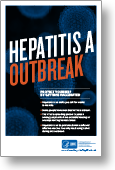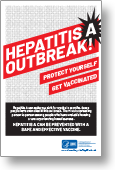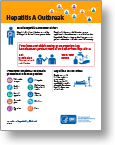People Experiencing Homelessness and Viral Hepatitis

People experiencing homelessness should be vaccinated against hepatitis A.
Consider testing for hepatitis B, and vaccinating if negative, in settings such as homeless shelters where services are provided to people at risk for hepatitis B virus infection. CDC recommends one-time hepatitis C testing of all adults (18 years and older) and regular testing for people with risk factors.
The risk for person-to-person transmission of HAV continues during the COVID-19 pandemic. The hepatitis A vaccine is the best way to prevent HAV infection. People at risk for acquiring HAV infection or developing serious complications from HAV infection during the current hepatitis A outbreaks should be prioritized to receive the hepatitis A vaccine as soon as it is possible to do so safely.
Learn more about safe administration of vaccines during the COVID-19 pandemic:
Learn how COVID-19 impacts people with viral hepatitis:
Hepatitis A
Since February 2019, CDC and the Advisory Committee on Immunization Practices (ACIP) has recommended hepatitis A vaccination for people experiencing homelessness. Hepatitis A virus (HAV) infection is associated with poor sanitation and hygiene and is transmitted by direct contact with an infectious person or by the ingestion of contaminated food or water. Congregate living conditions, both within and outside shelters, increase the risk for disease transmission among people experiencing homelessness, which can result in outbreaks. Widespread person-to-person outbreaks of hepatitis A are currently occurring across the United States. Vaccination is the most reliable protection from HAV infection and consists of a 2-dose schedule (or a 3-dose schedule when combined hepatitis A and B vaccine is administered).
Hepatitis B
While people experiencing homelessness are not included in the CDC and ACIP recommendations for hepatitis B testingexternal icon and vaccination, offering hepatitis B vaccination and testing in settings such as homeless shelters where services are provided to people at risk for hepatitis B virus (HBV) infection (including people with hepatitis C, people with chronic liver disease, people who use injection drugs, and people with HIV) can be an effective strategy to reach individuals who are difficult to access in the community.
Hepatitis C
CDC now recommends one-time hepatitis C testing of all adults (18 years and older). CDC continues to recommend people with risk factors, including people who inject drugs, be tested regularly.
A homeless person is defined as an individual
- who lacks housing (without regard to whether the individual is a member of a family), including an individual whose primary residence during the night is a supervised public or private facility (e.g., shelter) that provides temporary living accommodations and an individual who is a resident in transitional housing;
- without permanent housing who may live on the streets; stay in a shelter, mission, single-room occupancy facility, abandoned building or vehicle; or in any other unstable or nonpermanent situation;
- who is “doubled up,” a term that refers to a situation where individuals are unable to maintain their housing situation and are forced to stay with a series of friends and/or extended family members.
In addition, previously homeless individuals who are to be released from a prison or a hospital may be considered homeless if they do not have a stable housing situation to which they can return. A recognition of the instability of an individual’s living arrangements is critical to the definition of homelessness.
Sources:
- National Health Care for the Homeless Council. Understanding homelessness: frequently asked questions. Nashville, TN: National Health Care for the Homeless Council. https://nhchc.org/understanding-homelessness/faq/external icon
- Health Centers, 42 U.S.C. Sect. 254b. https://www.law.cornell.edu/uscode/text/42/254b#tab_default_2external icon
- Health Resources and Services Administration, Bureau of Primary Health Care. Health center program compliance manual. Glossary: 330(h) homeless population. Rockville, MD: Health Resources and Services Administration. https://bphc.hrsa.gov/programrequirements/compliancemanual/glossary.htmlexternal icon
Scientific Guidelines and Recommendations
Hepatitis A
MMWR 2019;68(6);153–156
Hepatitis B
Prevention of Hepatitis B Virus Infection in the United States: Recommendations of the Advisory Committee on Immunization Practices
MMWR 2018;67(No. RR-1):1–31
Hepatitis B Vaccination, Screening, and Linkage to Care: Best Practice Advice From the American College of Physicians and the Centers for Disease Control and Preventionexternal icon
Annals of Internal Medicine 2017;167(11);794–804
Hepatitis C
CDC Recommendations for Hepatitis C Screening Among Adults — United States, 2020
MMWR 2020; 69(2);1–17
Professional Resources
Viral hepatitis
Hepatitis A
- Hepatitis A Tools and Resources
- Hepatitis A Outbreak Resources
- FAQ: Hepatitis A Questions and Answers for Health Professionals
- FAQ: Frequently Asked Questions: Hepatitis A outbreaks
- HAN: Update: Widespread Outbreaks of Hepatitis A among People Who Use Drugs and People Experiencing Homelessness across the United States – March 2019
- HAN: Outbreak of Hepatitis A Virus (HAV) Infections among Persons Who Use Drugs and Persons Experiencing Homelessness – June 2018
- MMWR: Hepatitis A Virus Outbreaks Associated with Drug Use and Homelessness — California, Kentucky, Michigan, and Utah, 2017
Hepatitis B
Hepatitis C
Hepatitis A Vaccination
Posters, Digital Tools and Social Media
Download these posters and digital images to print and share via websites, email signatures, social media, digital advertising, or other online platforms to encourage health professionals and service providers to vaccinate people experiencing homelessness for hepatitis A.

“Give people experiencing homelessness a shot at a healthier tomorrow with a shot against hepatitis A today. The CDC recommends people experiencing homelessness get vaccinated against hepatitis A.”

“Protect their tomorrow today. Vaccinate against hepatitis A. The CDC recommends people experiencing homelessness get vaccinated against hepatitis A.”

“Their shot at a safer future starts with you. The CDC recommends people experiencing homelessness get vaccinated against hepatitis A.”

“DON’T WAIT TO VACCINATE. Outbreaks of hepatitis A are happening around the U.S., but the hepatitis A vaccine provides a safe and effective means of prevention. The CDC recommends people experiencing homelessness get vaccinated against hepatitis A.”
Resources for People Experiencing Homelessness
Hepatitis A Vaccination
Posters and Social Media
Download these posters, which you can localize, and digital images to share via social media and other digital or online platforms to encourage people experiencing homelessness to get vaccinated for hepatitis A.

“Protect your tomorrow today and get vaccinated against hepatitis A. The CDC recommends hepatitis A vaccination for people experiencing homelessness.”

“If you are experiencing homelessness, protect your tomorrow by asking your health care provider for a shot against hepatitis A today. “
Hepatitis A Outbreak
Fact Sheets
Posters

Poster for people experiencing homelessness encouraging hepatitis A vaccination

Poster for people experiencing homelessness encouraging hepatitis A vaccination
Digital tools

Information relating to the Hepatitis A Outbreak. To download the image, right-mouse-click on the link below and select the “save …” menu item to save the file to your own folder.
Professional and Provider Organization Resources
National Health Care for the Homeless Council
Clinical Resourcesexternal icon
